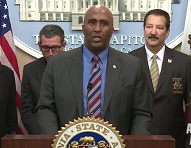Bill Would Open Smartphone Encryption Back Door

Jim Cooper, a member of the California assembly, has introduced a bill that would allow law enforcement to circumvent cell phone encryption to investigate human trafficking and other crimes.
Bill 1681 is not "the bogeyman or Edward Snowden," he said, but instead puts the responsibility on the tech industry.
Phones hold the evidence that could allow law enforcement not only to catch the bad guys, said human trafficking victims advocates at a press conference announcing the bill, but could also prevent victims from having to testify.
Current law requires that a smartphone sold in California be capable of being rendered inoperable and inaccessible to unauthorized users. That is meant to protect the information when it is stolen. The bill would require that such phones be rendered usable again by the manufacturer or operating system provider so that law enforcement could access it.
Failure to comply would trigger a $2,500-per-phone fine for each phone, no portion of which could be passed on to customers.
The issue was getting a lot of Web buzz this week, not surprising since technical encryption back doors are a hot topic in Washington these days.
On Monday, a top Department of Justice official was talking up such work-arounds as key to investigations into child abduction and terrorism.
Broadcasting & Cable Newsletter
The smarter way to stay on top of broadcasting and cable industry. Sign up below
Cooper's target is similarly serious crimes. He pointed out that half the victims of human trafficking were children.
"In 2014, cell phone manufactures began providing new operating systems for smartphones and tablets, these new operating systems employ, by default, 'full-disk encryption' (FDE)," his office said. "That can be a problem for law enforcement investigators."
Cooper said on introducing the bill: “Human traffickers are using encrypted cell phones to run and conceal their criminal activities," making them "an invaluable tool to prey on women, children, and threaten our freedoms while making the legal process of judicial court orders useless.”
More from B&C:
Comcast Gets Down to Business With Wi-Fi
Contributing editor John Eggerton has been an editor and/or writer on media regulation, legislation and policy for over four decades, including covering the FCC, FTC, Congress, the major media trade associations, and the federal courts. In addition to Multichannel News and Broadcasting + Cable, his work has appeared in Radio World, TV Technology, TV Fax, This Week in Consumer Electronics, Variety and the Encyclopedia Britannica.

